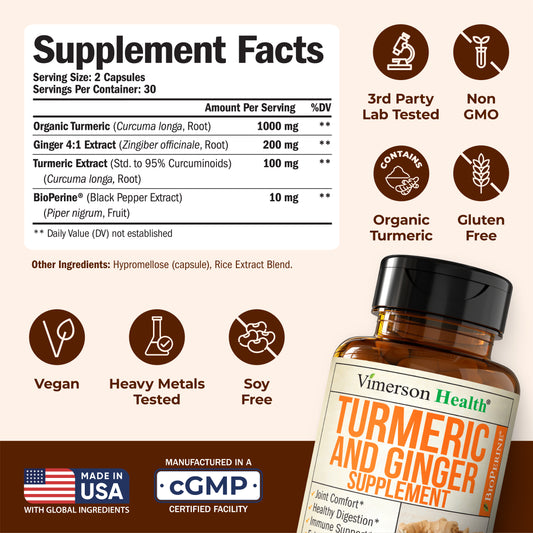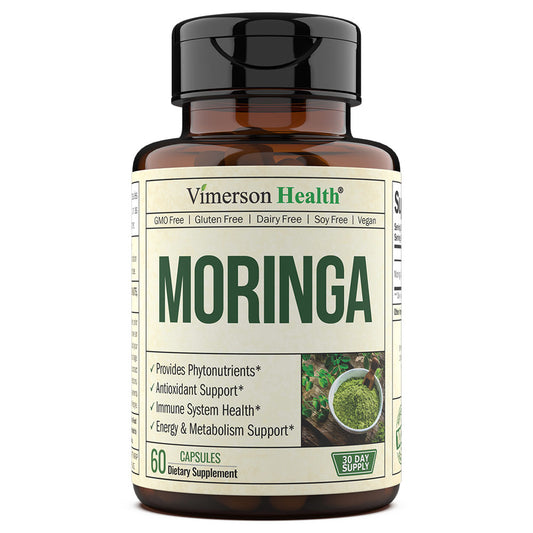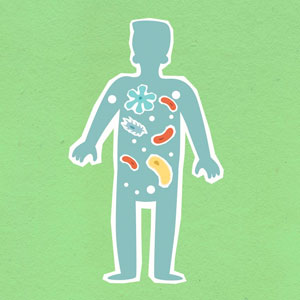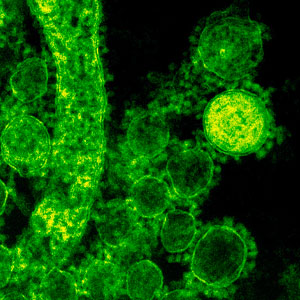-
Organic Spirulina and Chlorella Capsules - Spirulina Capsules with Chlorella Powder for Immune, Antioxidant & Energy Support. Nutritious Super Green. Vegan & Non-GMO. Third Party Tested. 60 Caps
Vendor:Vimerson HealthRegular price $23.97Regular priceUnit price per -
Turmeric Curcumin Supplement with Ginger Root for Joint Support, Digestive & Gut Health - Contains Organic Turmeric Curcumin with Black Pepper (Bioperine) for Enhanced Absorption - 60 Capsules
Vendor:Vimerson HealthRegular price $21.97Regular priceUnit price per -
Quercetin with Bromelain Turmeric Curcumin Supplement – Allergy Relief, Immune & Joint Support – Organic Turmeric Supplement w/ Bioperine for Enhanced Absorption, 60 Quercetin 500mg Capsules
Vendor:Vimerson HealthRegular price $24.97Regular priceUnit price per -
Vanadium with Chromium - Chromium Vanadium Supplement for Caffeine Free Energy and Metabolism Support. With Alpha Lipoic Acid, Cinnamon, Banaba Leaf & Bitter Melon Fruit. Non-GMO. Vegan. 60 Capsules
Vendor:Vimerson HealthRegular price $19.97Regular priceUnit price per -
Probiotics for Women & Men with Prebiotics - 40 Billion CFU Probiotics for Digestive Health, Gut Health & Immune Support Supplement - Lactobacillus Acidophilus Probiotic - Vegetarian, Soy & Dairy Free
Vendor:Vimerson HealthRegular price $21.97Regular priceUnit price per -
Mushroom 10x Complex with Lions Mane Extract, Turkey Tail, Cordyceps, Reishi, Shiitake, Chaga & Maitake for Cognitive Support – Vegan Mushroom Supplement Blend for Natural Energy & Focus – 60 Capsules
Vendor:Vimerson HealthRegular price $21.97Regular priceUnit price per -
Berberine Supplement with Third Party Tested Berberine 1800mg - Immune Support Supplement for Cardiovascular, Gastrointestinal Function & Metabolic Aid - Vegan & Non-GMO
Vendor:Vimerson HealthRegular price $22.97Regular priceUnit price per -
Turmeric Curcumin Supplement with Green Tea Extract (ECGC) & Vitamin C for Joint Health, Energy & Inflammation Balance - Organic Tumeric Curcumin with Black Pepper - Gluten-Free, Non-GMO - 60 Capsules
Vendor:Vimerson HealthRegular price $23.97Regular priceUnit price per -
Vitamin B Complex with Vit C & Folic Acid (Folate) - 8 High Potency B Vitamins: B1, B2, B3, B5, B6, B7, Vitamin B12 + Biotin, Choline & Inositol. Aids Mood, Energy, Nervous System & Immune Support
Vendor:Vimerson HealthRegular price $19.97Regular priceUnit price per -
Moringa Capsules with 100% Pure Moringa Powder for Balanced Energy, Healthy Metabolism, Antioxidant & Immune Support. Nutrient-Dense Superfood Vitamins. Vegan. Non-GMO. Third Party Tested. 60 Capsules
Vendor:Vimerson HealthRegular price $19.97Regular priceUnit price per -
Vitamin D3 K2 Supplement – All-in-1 Support for Immune, Bone & Heart Health with Vitamin D + Vitamin K (as MK7) – K2 D3 (5000 IU) Vitamin Supplement with Black Pepper for Max Absorption, 60 Capsules
Vendor:Vimerson HealthRegular price $22.97Regular priceUnit price per -
Fiber Supplement with 1080mg Psyllium Husk Powder, Slippery Elm for Women & Men, Ginger Root – High Fiber Pills for Regularity, Digestive & Gut Health – Gentle on Stomach 60 Psyllium Husk Capsules
Vendor:Vimerson HealthRegular price $27.47Regular priceUnit price per -
Turmeric Supplement with Glucosamine Chondroitin. Joint Supplements for Women & Men with Ginger, Boswellia, MSM & Tumeric Curcumin with Black Pepper (Bioperine). Aids Immune & Joint Support. 60 Caps
Vendor:Vimerson HealthRegular price $22.97Regular priceUnit price per -
Black Seed Oil - Cold Pressed Black Seed Oil Capsules - Provides Vitamin E & Omega 3 6 9 - High Potency (1500mg) for Immune & Joint Support, Antioxidants, Digestion, Hair Skin Nails - Vegan 90 Caps
Vendor:Vimerson HealthRegular price $25.97Regular priceUnit price per -
Vitamin B Complex with Vitamin B12, Niacin, Vitamin B2, Vitamin B6, Folic Acid 400mcg. B Complex Vitamins for Women & Men. Aids Mood, Energy, Nervous System & Immune Support. High Potency. One a Day
Vendor:Vimerson HealthRegular price $21.97Regular priceUnit price per
SUPPORTING YOUR BODY'S NATURAL DEFENSE SYSTEM
In today's fast-paced world, maintaining good health is paramount, and a robust immune system plays a pivotal role in protecting us from illnesses and infections. The immune system, our body's natural defense mechanism, is a complex network of cells, tissues, and organs that work in harmony to safeguard our well-being.

WHAT IS THE IMMUNE SYSTEM
➤ The immune system is your body's natural defense mechanism against infections and diseases. It's like a skilled army continuously patrolling and protecting you from harmful invaders. From the moment you are born, your immune system starts building its knowledge base, recognizing and remembering specific pathogens to mount a swift and effective response when exposed to them again.
THE SIGNIFICANCE OF IMMUNE SYSTEM CARE: SAFEGUARDING YOUR HEALTH AND WELL-BEING
Taking care of the immune system is essential for supporting the body's natural defense mechanisms and optimizing its ability to adapt to environmental changes, which in turn helps maintain a balanced state of health. A well-functioning immune system is instrumental in supporting optimal physical and mental well-being, allowing individuals to lead active and fulfilling lives.*
HOW THE IMMUNE SYSTEM RESPONDS TO THREATS
When harmful germs invade our body, the immune system acts quickly. Specialized cells identify and fight these invaders by releasing helpful substances like antibodies. This causes inflammation, which is the body's way of defending against infections. By doing this, the immune system keeps us safe from illnesses and ensures our defenses are ready to handle any potential threats that come our way, keeping us healthy and protected.
GOING DEEPER INTO EVERY NEED OF THE IMMUNE SYSTEM

✦ BOOSTING THE IMMUNE SYSTEM NATURALLY
A strong immune system is vital for defending the body against infections and illnesses. Adopting healthy lifestyle habits can naturally boost the immune system and enhance overall well-being.
- Maintain a balanced and nutritious diet to provide essential nutrients for immune function.
- Stay hydrated by drinking plenty of water to support immune responses.
- Incorporate immune-boosting foods like citrus fruits, berries, garlic, and ginger into your diet.
- Get regular physical activity to improve circulation and immune cell function.
- Prioritize sleep to allow the body to repair and restore the immune system.
- Practice good hygiene, such as frequent handwashing, to prevent the spread of infections.
- Manage stress through relaxation techniques like meditation and deep breathing, as chronic stress can weaken the immune system.
- Avoid smoking and excessive alcohol consumption, as they can impair immune function.
- Maintain a healthy weight and avoid yo-yo dieting, which can negatively affect the immune system.
✦ ESSENTIAL NUTRIENTS FOR IMMUNE SUPPORT
Certain nutrients play crucial roles in supporting immune function and keeping the body healthy.
- Vitamin C is a potent antioxidant that strengthens the immune system and helps fight infections.*
- Vitamin D is essential for immune cell function and can be obtained through sunlight exposure and dietary sources.*
- Zinc supports immune cell development and function and is found in foods like meat, nuts, and seeds.*
- Vitamin A helps maintain the integrity of the skin and mucous membranes, acting as a barrier against infections.*
- Vitamin E is an antioxidant that protects immune cells from damage caused by free radicals.*
- B vitamins, particularly B6, B9 (folate), and B12, are crucial for immune cell production and function.*
- Iron is necessary for immune cell proliferation and can be obtained from lean meats, beans, and leafy greens.*
- Selenium supports immune cell activity and can be found in Brazil nuts, fish, and poultry.*
- Consuming a balanced diet rich in fruits, vegetables, whole grains, and lean proteins ensures adequate intake of essential immune-supporting nutrients.
✦ THE GUT-IMMUNE CONNECTION
The gut and immune system are intricately linked, with a well-balanced gut microbiome playing a significant role in immune function.
- The gut houses a large portion of the immune system, known as gut-associated lymphoid tissue (GALT).
- Beneficial gut bacteria support immune responses and help protect against harmful pathogens.
- An imbalanced gut microbiome can lead to immune dysfunction and increase the risk of infections and autoimmune disorders.
- Consuming prebiotic-rich foods like fiber and probiotic-rich foods like yogurt and fermented products can support gut health and strengthen the immune system.
- Avoiding unnecessary antibiotic use preserves the diversity of the gut microbiome.
- Chronic gut inflammation can negatively impact immune responses.
- A healthy gut contributes to overall immune resilience and helps maintain optimal health.
✦ SLEEP AND IMMUNE FUNCTION
Quality sleep is essential for a well-functioning immune system, as the body carries out crucial immune processes during rest.
- During sleep, the body produces and releases immune cells and cytokines that help fight infections.
- Chronic sleep deprivation can lead to a weakened immune system and increase susceptibility to infections.
- Aim for 7-9 hours of sleep per night to support immune health.
- Maintain a consistent sleep schedule, even on weekends, to regulate the body's internal clock.
- Create a calming bedtime routine to signal the body that it's time to sleep.
- Keep the sleep environment comfortable, dark, and quiet to promote restful sleep.
- Limit caffeine and electronic device use before bedtime, as they can disrupt sleep patterns.
- Practice relaxation techniques like meditation or deep breathing to reduce stress and improve sleep quality.
- If sleep disturbances persist, consider seeking guidance from a healthcare professional to address underlying issues.
✦ MANAGING STRESS FOR A STRONG IMMUNE SYSTEM
Chronic stress can suppress immune function and increase vulnerability to infections and illnesses. Implementing stress management techniques is crucial for supporting immune health.
- Practice mindfulness and meditation to reduce stress and promote emotional well-being.
- Engage in regular physical exercise, which can help combat stress and boost mood.
- Prioritize self-care and set aside time for activities that bring joy and relaxation.
- Maintain a healthy work-life balance to prevent burnout and excessive stress.
- Connect with friends and family and nurture social relationships to support mental and emotional health.
- Limit exposure to stressors whenever possible and find healthy ways to cope with unavoidable stress.
- Consider counseling or therapy if stress levels are significantly impacting daily life.
- Relaxation techniques like yoga or deep breathing can activate the body's relaxation response, counteracting the effects of chronic stress on the immune system.
- Regular exercise, adequate sleep, and a balanced diet are essential components of stress management and immune support.
✦ BENEFITS OF REGULAR EXERCISE FOR IMMUNITY
Regular physical activity offers numerous benefits for immune health, contributing to a strong and resilient immune system.
- Exercise improves circulation, allowing immune cells to move freely throughout the body.
Moderate-intensity exercise, such as brisk walking or cycling, may reduce the risk of upper respiratory tract infections. - Engaging in regular physical activity can reduce inflammation and support immune responses.
- Exercise helps manage body weight, which can positively impact immune function.
- The release of endorphins during exercise can boost mood and reduce stress, supporting overall well-being.
- Aim for at least 150 minutes of moderate-intensity exercise or 75 minutes of vigorous exercise per week.
- Include a mix of aerobic exercises, strength training, and flexibility exercises for comprehensive health benefits.
- Listen to your body and adjust exercise intensity or duration as needed to prevent overtraining and promote recovery.
- Always consult with a healthcare professional before starting a new exercise regimen, especially if there are underlying health conditions.
✦ IMMUNE-SUPPORTING HERBS AND SUPPLEMENTS
Certain herbs and supplements have been traditionally used to support immune health, although their efficacy may vary from person to person.*
- Echinacea is believed to stimulate immune responses and may help reduce the duration of cold symptoms.*
- Elderberry is rich in antioxidants and may have antiviral properties, potentially providing rapid immune support.*
- Zinc supplements can help support immune function, helping the immune cells to work their best.*
- Vitamin C supplements are popular for immune support and are believed to enhance immune responses.*
- Vitamin D supplements may be beneficial for individuals with low vitamin D levels, as vitamin D plays a role in immune regulation.*
- Probiotic supplements can support gut health and, in turn, positively influence immune function.*
Always consult with a healthcare professional before starting any new herbal or supplement regimen, as some may interact with medications or have side effects.
While supplements can complement a healthy lifestyle, they should not replace a balanced diet and other immune-supporting habits.
✦ IMMUNE HEALTH IN DIFFERENT LIFE STAGES
Immune health is essential at every life stage, and certain considerations can enhance immune support based on age and specific needs.
- For infants: Breastfeeding provides essential antibodies for immune protection, and vaccination schedules should be followed as recommended.
- For children: Encourage a varied diet rich in fruits, vegetables, and whole grains to provide essential nutrients for immune development. Encourage regular physical activity and proper hygiene practices to reduce the risk of infections
- For teenagers: Promote a balanced diet and sufficient sleep to support immune health during this period of growth and development. Encourage stress management techniques to cope with academic and social pressures, as chronic stress can affect immune function.
- For adults: Maintain a healthy lifestyle with a nutrient-rich diet, regular exercise, and adequate sleep to support overall immune resilience. Avoid smoking and excessive alcohol consumption, as they can weaken the immune system. Stay up-to-date with vaccinations to protect against preventable infections.
- For pregnant women: Prioritize prenatal care and follow healthcare provider recommendations for vaccinations and supplements, such as folic acid and prenatal vitamins, to support both maternal and fetal immune health.
- For seniors: Support immune health through a balanced diet and regular exercise. Adequate nutrient intake, especially vitamins D and B12, is essential as nutrient absorption may decline with age. Stay socially engaged to reduce feelings of isolation and loneliness, which can impact immune function.
THE GUT-IMMUNE HEALTH CONNECTION
The Gut-Immune Health Connection is a crucial aspect of overall well-being. Scientific research has highlighted the intricate relationship between the gut microbiome and the immune system. A balanced and diverse gut microbiome plays a significant role in supporting immune function, helping to defend the body against harmful pathogens and maintain optimal health.
CONCLUSION ABOUT IMMUNE HEALTH
Immune health is the key to a resilient and thriving body. By understanding the immune system's workings and adopting a healthy lifestyle, including nutritious diet choices, regular exercise, sufficient sleep, stress management, and proper hygiene, you can fortify your immune system and protect your overall well-being. Embrace the power of immunity and give your body the best chance to stay strong and healthy throughout life!
ℹ Frequently Asked Questions About Immune Health
WHAT IS YOUR IMMUNE HEALTH?
Your immune health refers to how well your body's immune system can defend against infections and diseases to keep you healthy.
HOW CAN I BOOST MY IMMUNE HEALTH?
You can boost your immune health by adopting a balanced diet, getting regular exercise, managing stress, getting enough sleep, and avoiding smoking or excessive alcohol consumption.
HOW IMPORTANT IS IMMUNE HEALTH?
Immune health is crucial because a strong immune system helps protect you from infections, viruses, and illnesses, promoting overall well-being and reducing the severity of diseases.
WHAT ARE 5 SIGNS OF A WEAK IMMUNE SYSTEM?
Signs of a weak immune system include frequent infections, slow wound healing, fatigue, digestive issues, and recurrent colds or flu-like symptoms.
WHAT CAUSES POOR IMMUNE HEALTH?
Poor immune health can result from factors like an unhealthy diet, lack of exercise, chronic stress, inadequate sleep, and exposure to environmental toxins.
WHICH VITAMINS BOOST THE IMMUNE SYSTEM?
Vitamins that boost the immune system include vitamin C, vitamin D, vitamin E, vitamin A, and vitamin B6, which help support immune function.*
IS IT OK TO TAKE VITAMIN C AND D TOGETHER?
Yes, it's generally safe to take vitamin C and vitamin D together. They can complement each other and support immune health, but it's essential to follow recommended dosages.
IS VITAMIN C ENOUGH FOR IMMUNITY?
While vitamin C plays a vital role in supporting the immune system, overall immune health requires a balanced diet, regular exercise, and other essential nutrients.*
DOES ZINC HELP THE IMMUNE SYSTEM?
Yes, zinc is important for the immune system. It helps produce immune cells, supports wound healing, and may help manage the duration and severity of some occasional discomfort.*
HOW CAN I BOOST MY IMMUNE SYSTEM QUICKLY?
To quickly boost your immune system, focus on healthy habits like consuming vitamin-rich foods, staying hydrated, getting enough rest, and managing stress. However, remember that immune health is a continuous effort.
* These statements have not been evaluated by the Food and Drug Administration. This product is not intended to diagnose, treat, cure, or prevent any disease.






































